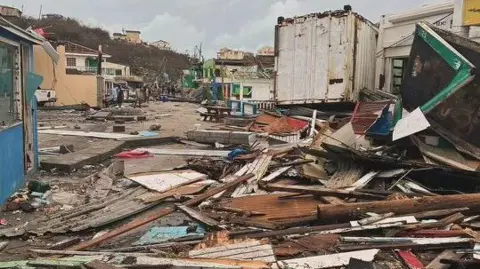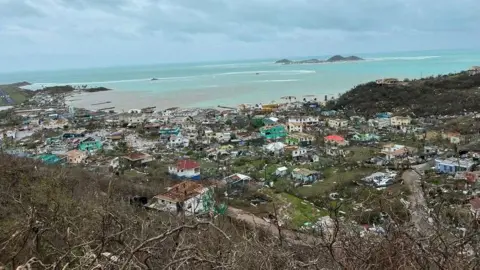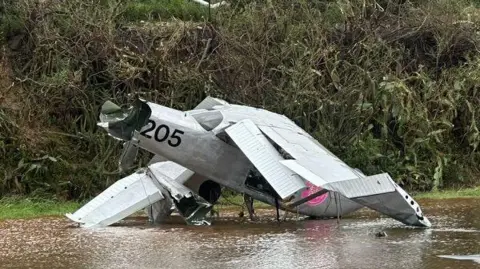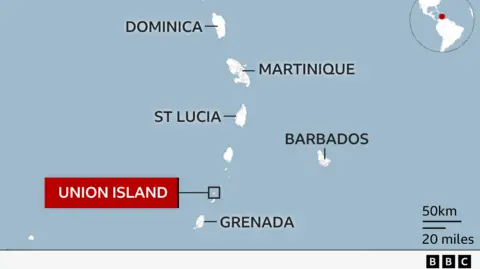
Intense waves as Hurricane Beryl advances in Santo Domingo, Dominican Republic, on Tuesday. The Dominican Republic began to feel the indirect effects of Hurricane Beryl, keeping the country's emergency services on alert. Hurricane Beryl caused severe damage in several Caribbean countries and killed at least six people. Photo by Orlando Barria/EPA-EFE
July 2 (UPI) -- Hurricane Beryl, the earliest Category 5 hurricane on record in the Atlantic, has killed at least six people and caused severe damage after slamming the Caribbean. The downgraded Category 4 storm was heading toward Jamaica on Tuesday with sustained winds of 155 mph.
"Devastating hurricane-force winds, life-threatening storm surge and damaging waves are expected in portions of Jamaica and the Cayman Islands on Wednesday and Wednesday night," the National Hurricane Center warned, as it forecast up to 12 inches of rain.
The National Oceanic and Atmospheric Administration's satellites captured the first four days of Beryl, as the storm grew from a "tropical cyclone in the western Atlantic Ocean to a Category 5 hurricane in the Caribbean Sea."
Since Monday, the hurricane has torn through the island of Cariacou in Grenada, St. Vincent and the Grenadines, as well as Venezuela. At least six people have died, as Cariacou was "flattened" in half-an-hour, according to Grenada Prime Minister Dickon Mitchell.
Mitchell reported three people were killed in Cariacou on Monday, with another death reported in St. Vincent and the Grenadines. Two people were killed in northern Venezuela, according to officials.
At least five other people are missing in Venezuela, according to Remigio Ceballos Ichaso, the Venezuelan minister of Interior Relations.
In addition to the deaths, Beryl's heavy rains and winds have caused landslides, leveled buildings and taken out power systems, as scientists have warned of a more active and extreme hurricane season this year.
Jamaica's two main airports -- Sangster International Airport in Montego Bay and Norman Manley International Airport in the capital of Kingston -- were closed Tuesday night.
"This decision has been made in the interest of safety for staff and passengers and the protection of airport infrastructure," PAC Kingston Airport said in a statement.
Hundreds of evacuees fled Jamaica on Tuesday for South Florida, at the urging of Jamaica's Prime Minister Andrew Holness.
"I'm encouraging all Jamaicans to take the hurricane as a serious threat, but now is not a time for panic," Holness said.
"We are also continuing our drain-cleaning efforts across the island as we prepare for Hurricane Beryl," Holness added Tuesday in a post on X.
Cruise lines in the Caribbean were rerouting their ships Tuesday night.
"The safety of our guests and crew is paramount," Carnival Cruise Line said in a statement, "and we are continuing to monitor forecasts and factor in guidance from the National Hurricane Center, U.S. Coast Guard and local port authorities to provide timely updates to our guests as more information becomes available."
President Joe Biden announced Tuesday that the United States is ready to provide assistance.
"People, impacted islands and communities are in our prayers, and we stand by to provide assistance to them," Biden said during an event on extreme weather.
"Ignoring climate change is deadly and dangerous and irresponsible," Biden added. "These climate-fueled extreme weather events don't just affect people's lives. They also cost money."
On Tuesday afternoon, NOAA's WP-3d Orion hurricane hunter aircraft flew inside the eye of Hurricane Beryl over the Caribbean, producing some stunning photos in a post on X.
Hurricane Beryl kills seven as it churns towards Jamaica
Hurricane Beryl churned towards Jamaica Tuesday, with forecasters warning of potentially deadly winds and storm surge, after the storm killed at least seven people and caused widespread destruction across the southeastern Caribbean.
The powerful hurricane, which is rare so early in the Atlantic season, weakened Tuesday but was still an “extremely dangerous” Category 4 storm, and is expected to pass “near or over” Jamaica on Wednesday, meteorologists said.
Beryl is the first storm since US National Hurricane Center records began to reach the Category 4 level in June, and the earliest to reach Category 5 in July.
A hurricane warning was in place for the island nation, according to the NHC, which said rain and flash flooding was to be expected in addition to the life-threatening wind and high water levels.
Across Jamaica, emergency response preparations were underway, with shelters stocking up on provisions, people safeguarding their homes and boats being pulled from the water.
“I urge all Jamaicans to stock up on food, batteries, candles, and water. Secure your critical documents and remove any trees or items that could endanger your property,” Prime Minister Andrew Holness said on X.
Hurricane warnings were also issued in the Cayman Islands, which Beryl is “expected to pass near or over” on Wednesday night or early Thursday, according to the NHC.
In the Dominican Republic, massive waves were seen crashing into the shore along Santo Domingo as the storm passed to the country’s south, AFP photographers reported.
‘No communication’ –
Beryl has already left a trail of death in its wake with at least three people killed in Grenada, where Beryl made landfall Monday, as well as one in St Vincent and the Grenadines and three in Venezuela, officials said.
Grenada’s Prime Minister Dickon Mitchell said the island of Carriacou, which was struck by the eye of the storm, has been all but cut off, with houses, telecommunications and fuel facilities there flattened.
“We’ve had virtually no communication with Carriacou in the last 12 hours except briefly this morning by satellite phone,” Mitchell told a news conference.
The 13.5-square mile (35-square kilometer) island is home to around 9,000 people. At least two people there died, Mitchell said, with a third killed on the country’s main island of Grenada when a tree fell on a house.
In St. Vincent and the Grenadines, one person on the island of Bequia was reported dead from the storm, and a man died in Venezuela’s northeastern coastal state of Sucre when he was swept away by a flooded river, officials there said.
World Health Organization chief Tedros Adhanom Ghebreyesus expressed concern about the region, saying on X that his organization “stands ready to support the national authorities with any health needs.”
‘Alarming precedent’ –
Experts say it is extremely rare for such a powerful storm to form this early in the Atlantic hurricane season, which runs from early June to late November.
Warm ocean temperatures are key for hurricanes, and North Atlantic waters are currently between two and five degrees Fahrenheit (1-3 degrees Celsius) warmer than normal, according to the US National Oceanic and Atmospheric Administration.
The World Meteorological Organization (WMO) said Beryl “sets an alarming precedent for what is expected to be a very active hurricane season.”
NOAA said in late May that it expects this year to be an “extraordinary” hurricane season, with up to seven storms of Category 3 or above.
Climate crisis ‘chief culprit’ –
UN climate chief Simon Stiell, who has family on the island of Carriacou, said climate change was “pushing disasters to record-breaking new levels of destruction.”
“Disasters on a scale that used to be the stuff of science fiction are becoming meteorological facts, and the climate crisis is the chief culprit,” he said Monday, reporting that his parents’ property was damaged.
As of 2300 GMT, Beryl had maximum sustained winds of 150 miles (240 kilometers) per hour as it headed towards Jamaica and the Cayman Islands on Tuesday, according to the NHC.
A hurricane watch and tropical storm warnings have also been issued for parts of Haiti.
By Will Grant,

Having survived the night as Hurricane Beryl tore across her idyllic home of Union Island with ferocious force, Katrina Coy was taken aback by the extent of the devastation which lay before her.
Virtually every building on the island, which lies off St Vincent and the Grenadines, has been razed or badly damaged, she said.
“Union Island is in a terrible state after Beryl passed. Literally, almost the whole island is homeless,” said Ms Coy in a video message.
“There are hardly any buildings left standing. Houses are flattened, roads are blocked, the electricity poles are down in the streets.”
Fisherman and fishing guide Sebastien Sailly agreed.
“Everything is lost. I have nowhere to live right now,” he said.
A resident of Union since 1985, he lived through Hurricane Ivan in 2004. But Hurricane Beryl, he said, was on another level.
“It’s like a tornado has passed through here. Ninety percent of the island – easily 90% – has been erased.”
The extent of the shock and fear is still evident in his voice.
“I was sheltering with my wife and daughter and, to tell you the truth, I wasn’t sure we would make it out at all.”
His cousin, Alizee, who runs a hotel with her family, described a horrific experience as Beryl passed over their town.
She said they had to push furniture against the doors and windows to keep the sustained winds and huge gusts from blowing them open.


“The pressure was so intense that you felt it in your ears. We could hear the roof coming apart and smashing into another building. Windows breaking, flooding.”
“No one knew it would be this bad, everyone is traumatised.”
An organic farmer and beekeeper as well as a fisherman, Sebastien’s two farms and his beehives have been completely destroyed as well.
Still, he said the community’s immediate priority is shelter. People have been trying to gather wood and plastic sheeting to make some kind of temporary accommodation for their families.
“And obviously, finding water and food is going to be tough,” he added.
Alizee Sailly said many other goods are also urgently needed on Union Island – from tinned foods and powdered milk to sanitary products, first-aid kits and tents.

Plus, of course, generators.
With power and communications still down, she has only managed to send out messages by connecting to the Starlink network launched by Elon Musk's SpaceX.
For its part, the government in St Vincent and the Grenadines says it recognises the scale of the problem.
In a morning address, Saint Vincent and the Grenadines Prime Minister Ralph Gonsalves summed up the sense of the shock across the Caribbean nation: "Hurricane Beryl – this dangerous and devastating hurricane – has come and gone and it’s left in its wake immense destruction. Pain and suffering across our nation.”
He also promised to react as quickly as possible to tackle the long list of post-hurricane priorities facing his administration.
On Union Island, however, there remains some scepticism that the government has the funds, resources and manpower to cope.
“I hope they can send us the military and the coastguard to help us. I have no idea if they’re able to rebuild the island but I don’t think so”, said Sebastien. “This is going to take billions, it will take a year or more and is going to need international help.”
Katrina Coy, the director of the Union Island Environmental Alliance, also implored members of the Caribbean diaspora to help in any way they could.
“We’re in dire need of help. Emergency kits, food, evacuation, all of that is needed in this moment.”
For years, Ms Coy has carried out crucial work for Union Island’s water security, a vital resource for small island communities in the Caribbean.
Heartbreakingly, her international colleagues say, that work has been lost to Hurricane Beryl.
Beryl hit land on Monday as a category four hurricane, with sustained winds of 150mph (240km/h).
Thousands of people are still without power and many are in temporary shelters in St Vincent and the Grenadines, Grenada and St Lucia.
Yet despite the chaos and the homelessness across every inch of the island Sebastian Sailly said he was just thankful things weren’t even worse.
“The most important thing is that we are still alive, not the material losses.”
“After witnessing the power of what we went through, today I was just pleased to see my neighbours were still here.”
No comments:
Post a Comment